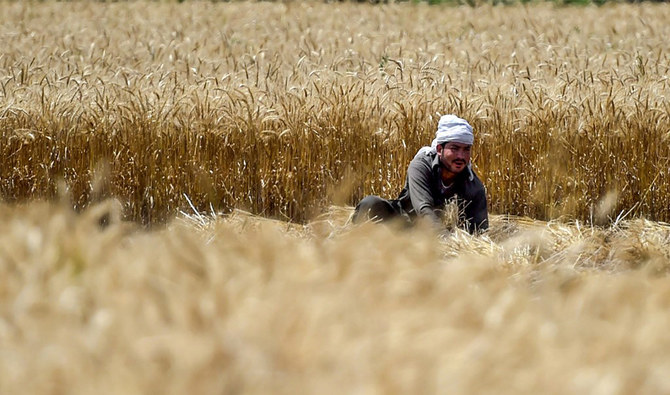ISLAMABAD: The government has abolished various taxes and duties on Pakistan’s imports of wheat to bring down its price in the local market and ensure smooth supply of subsidized wheat flour to the public, officials said on Saturday.
Wheat is one of the main agricultural crops in Pakistan, with around 80 percent of farmers growing it on an area of about 9 million hectares — close to 40 percent of the country’s total cultivated land. For the last couple of years, experts say, Pakistan has been facing wheat shortages driven mainly by a rapid population growth and climate change.
“We have offered multiple incentives to wheat importers including exemption from the anti-hoarding act, sales tax and withholding tax,” Dr. Javed Humayun, senior joint secretary at the Ministry of National Food Security and Research, told Arab News on Saturday.
Dr. Javed Ahmad, director Wheat Research Institute talks to Arab News.
With the new policy that was unrolled on Wednesday, wheat importers will be exempt from the 60 percent regulatory duty, 11 percent customs duty, 17 percent sales tax and 6 percent withholding tax. Exemption from the anti-hoarding act means the government will allow them to store as much of the imported wheat as they want to.
Humayun said Pakistan had failed to achieve its wheat production target this year due to multiple reasons, including unexpected torrential rains from February to April, which destroyed the crop.
Against the production target of 27 million metric tons, Pakistan’s yield was 25.5 million tons, while it could procure only 6 million tons from growers to release the commodity at a subsidized rate — the target was 8.25 million tons, according to official data.
The wheat subsidy is in place to maintain official rates for wheat flour in the market. Failure to meet the procurement target results in price hikes and shortage of the staple.
The government has been under public pressure for the past two years for being unable to maintain wheat flour prices in the market and blamed growers and businessmen for hoarding the commodity to create artificial shortage.
Encouraged by the new wheat import policy, the private sector has already booked 270,000 metric tons of wheat for August and September. This, according to the government, will help make wheat flour available in the open market at affordable rates.
“Once the imported wheat hits the local market, this artificial shortage and price hike of the wheat flour will be over,” Humayun said.
According to members of the opposition, however, the government should first improve its procurement procedures as its failure to meet the target for subsidized wheat is due to the low rates it offers to farmers, who in turn choose to sell the commodity to businessmen, instead of government agencies.
“The private sector would buy more wheat from farmers by offering attractive rates against the government’s support price of Rs1,400 ($8.36) per 40 kilograms,” Syed Muzafar Hussain Shah, an opposition lawmaker and chairman of the Senate committee on food security, told Arab News.
“The government needs to focus on improving the per hectare yield of the crop to meet the required demand with the rapidly growing population,” Shah said, adding that the country’s demand for wheat was expected to increase to 34 million tons by 2028 with the population growth rate of 2.4 percent.
The government’s research institutes have been struggling to introduce new seed varieties to enhance the yield and fight adverse impacts of the changing climate.
“We are encouraging farmers to plant new seed varieties which give better yield along with resistance to rust disease,” Dr. Javed Ahmad, director at Wheat Research Institute in Faisalabad, told Arab News.
The process is complex and while the Faisalabad institute has developed around 70 seed varieties of wheat, Ahmad said only 10 of them have so far been recommended for cultivation.











